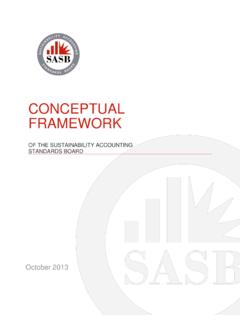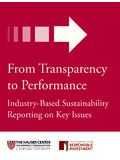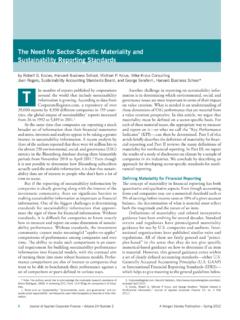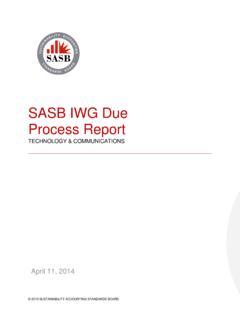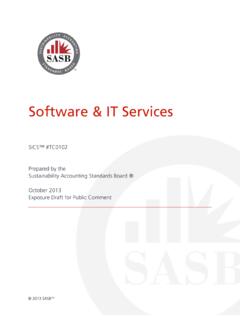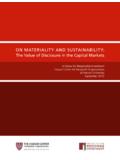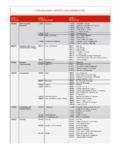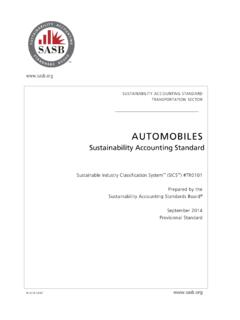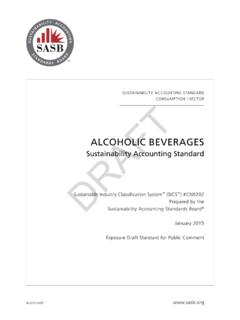Transcription of Hardware - Sustainability Accounting Standards Board
1 2013 SASBTM Hardware SICS #TC0103 Prepared by the Sustainability Accounting Standards Board October 2013 Exposure Draft for Public Comment 2013 SASBTM Sustainability Accounting STANDARD EXPOSURE DRAFT | 1 Hardware Sustainability Accounting Standard About SASB The Sustainability Accounting Standards Board (SASB) provides Sustainability Accounting Standards for use by publicly-listed corporations in the in disclosing material Sustainability issues for the benefit of investors and the public. SASB Standards are designed for disclosure in mandatory filings to the Securities and Exchange Commission (SEC), such as the Form 10-K and 20-F.
2 SASB is an independent 501(c)3 non-profit organization and is accredited to set Standards by the American National Standards Institute (ANSI). SASB is developing Standards for more than 80 industries in 10 sectors. SASB s Standards -setting process includes evidence-based analysis with in-depth industry research and engagement with a broad range of stakeholders. The end result of this process is the creation of a complete, industry-specific Accounting standard which accurately reflects the material issues for each industry. About this Standard This Standard is an exposure draft presented for public review and comment.
3 This version is not intended for implementation. The public comment period lasts for 90 days beginning Wednesday, October 2, 2013 and ending Thursday, January 2, 2014. This Standard is subject to change thereafter. For instructions on providing comments to SASB please click here. For an introduction to SASB Standards please click here. Sustainability Accounting Standards Board 75 Broadway, Suite 202 San Francisco, CA 94111 SASB Legal Publications Disclaimer: The content made available in this publication is copyrighted by the Sustainability Accounting Standards Board .
4 All rights reserved. You agree to only use the content made available to you for non-commercial, informational or scholarly use within the organization you indicated you represent and to keep intact all copyright and other proprietary notices related to the content. The content made available to you may not be further disseminated, distributed, republished or reproduced, in any form or in any way, outside your organization without the prior written permission of the Sustainability Accounting Standards Board . To request permission, please contact us at 2013 SASBTM Sustainability Accounting STANDARD EXPOSURE DRAFT | 2 SASB Sustainability Accounting Standard Hardware (TC0103) Industry Description The Hardware industry consists of companies that design, assemble, and manufacture computers, computer Hardware , servers, and computer peripherals.
5 The industry relies heavily on the Electronic Manufacturing Services (EMS) and Original Design Manufacturing (ODM) industry for both design and manufacturing services. Note: Select companies in the Hardware industry are also engaged in activities of the Software and IT Services industry. SASB Standards for such activities are outlined in the Software and IT Services industry Standards . Table 1. Material Sustainability Topics & Accounting Metrics Topic Code Accounting Metric Energy Management in Manufacturing TC0103-01 Total annual energy consumed (gigajoules); percentage from purchased grid electricity.
6 Percentage of non-grid energy from fossil fuels and renewables ( , wind, biomass, solar). Water and Waste Management in Manufacturing TC0103-02 Total water withdrawn (m^3), returned to watershed (m^3), internally recycled (m^3); and for each indicate the percentage in water-stressed regions, defined as High or Extremely High Baseline Water Stress as defined by the WRI Water Risk Atlas. TC0103-03 Amount of waste (tons) broken down by the following waste types: (1) Hazardous; (2) Non-hazardous; (3) Electronic waste (e-waste). For each waste type, indicate the percentage that is recycled, treated, incinerated, and landfilled; and the weighted average cost ($) per ton for each disposal method.
7 Data Security Products TC0103-04 Discussion of the integration of data security features into product design and new product development to improve cyber security for customers. Where relevant, include revenue from specific security-related products. Employee Recruitment and Inclusion TC0103-05 Percentage of employees that are foreign nationals. Describe potential risks of recruiting foreign nationals, and the management approach to addressing these risks. TC0103-06 Discuss constraints on local hiring of technical staff due to difficulty in finding qualified personnel; include median length of vacancies for technical positions.
8 Indicate number of new domestic technical staff hired through company-funded or company-facilitated programs to develop domestic workforce. TC0103-07 Number of total employees and number by gender and ethnic group in each of the following two employee categories: Executive/Sr. Manager and Non-Executive. Product Lifecycle Management TC0103-08 Percentage of products (by revenue) that meet the requirements of the European Union s Restriction of Hazardous Substances (RoHS) Directive. TC0103-09 Discussion of usage of Registration, Evaluation, Authorisation and Restriction of Chemical (REACH) substances of very high concern (SVHC) and chemicals listed in Joint Industry Guide (JIG) 101 ed.
9 , Table A. Declarable Substance List. 2013 SASBTM Sustainability Accounting STANDARD EXPOSURE DRAFT | 3 Topic Code Accounting Metric TC0103-10 Percentage of eligible products (by revenue) certified to a recognized voluntary, environmentally-focused certification standard TC0103-11 Percentage of products (by revenue) with environmentally focused principles incorporated into the designs, including a description of the design principles or criteria. TC0103-12 Amount (weight) of products recovered through take-back programs. Percentage of recovered products (by weight) that are (a) reused, (b) remanufactured, (c) recycled, and (d) landfilled.
10 Percent of total classified as electronic waste (e-waste), percentage of e-waste recycled though entities with Basel e-Stewards certification. Supply Chain Management and Materials Sourcing TC0103-13 Discuss existing or projected constraints with obtaining raw materials (or components), including those related to political situations, local labor conditions, natural disasters, climate change, geography, regulations, or restricted/limited availability. Discuss any production shortfall resulting from materials supply; indicate the cause and the relative impact on production. TC0103-14 Number of sole-source Tier 1 suppliers, and percentage of critical supply base for which suppliers are sole-source.
